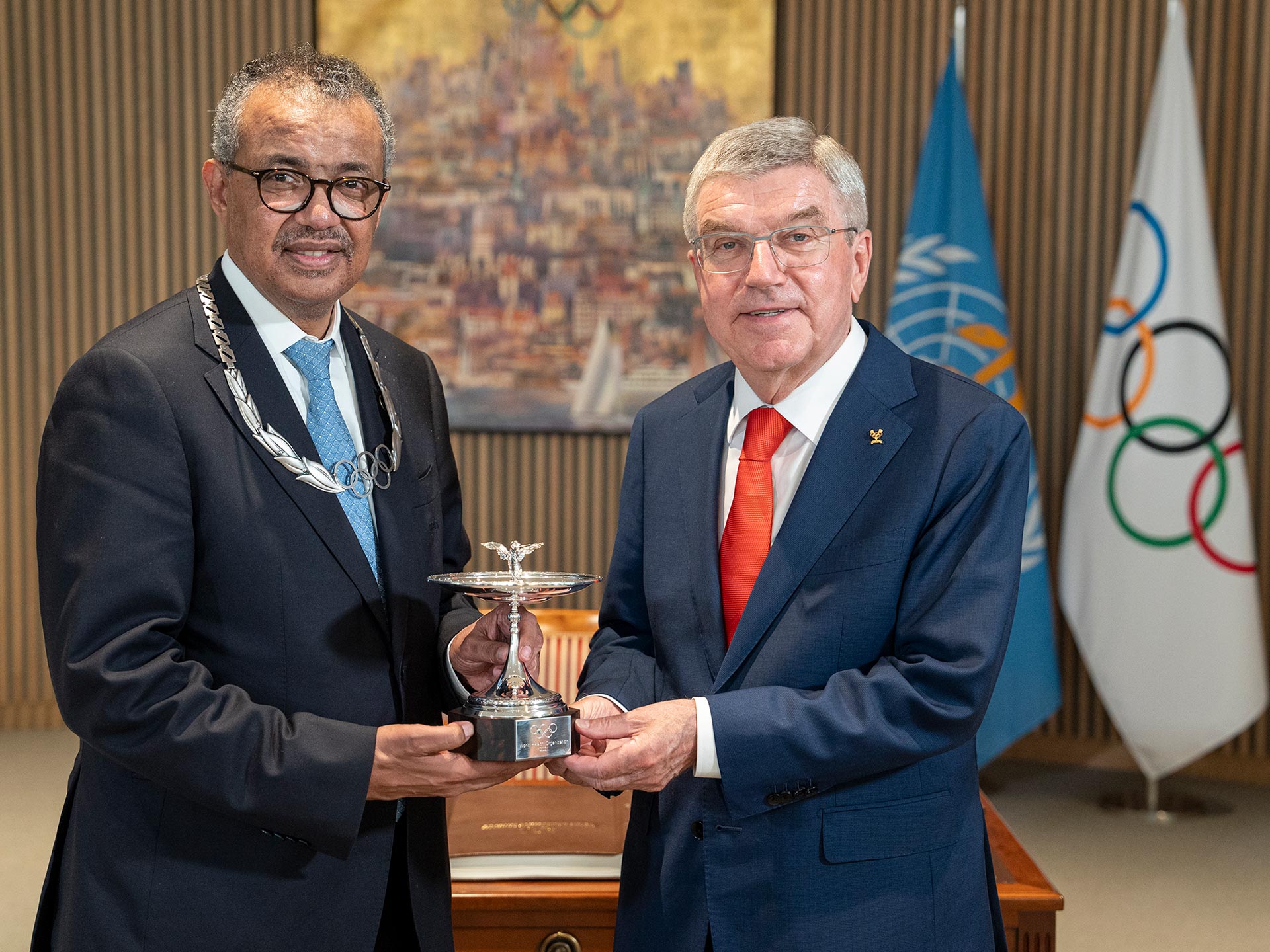The Director-General of the World Health Organization (WHO), Dr Tedros Ghebreyesus, was presented with the Olympic Order today by International Olympic Committee (IOC) President Thomas Bach. The award ceremony was held at Olympic House in Lausanne, Switzerland. At the same time, the IOC honoured the WHO, as an organisation, with the Olympic Cup for 2021.
Reflecting on the unprecedented challenge of organising Tokyo 2020, the first-ever Games to be postponed in Olympic history, as a result of the COVID-19 pandemic, President Bach described the personal support and guidance he received from Dr Tedros as crucial: “Your advice was essential for us to develop the comprehensive countermeasures. Your expertise and wise counsel resulted in the so-called Playbooks detailing the specific countermeasures.”
He continued: “I would like to again express my heartfelt thanks to you, because from the outset you supported the Playbooks and made your support known publicly to instil confidence in the athletes, the Japanese Organising Committee, the National Olympic Committees and the public at large.”
“You stood with us all the way. You kept your promise and came to Tokyo, where you addressed the IOC Session and a worldwide audience. This is why it is fair to say that, without your steadfast personal support, these Olympic Games could not have happened in this safe way.”
President Bach invited Dr Tedros to be an IOC guest of honour at the Olympic Games Paris 2024.
Please find here the full speech by the IOC President.
Responding to his award, Dr Tedros said: “It is with deep pride and humility that I receive the Olympic Order and, on behalf of WHO, the 2021 Olympic Cup. I thank all colleagues working around the world for their work to protect and promote health.
“I thank in particular the WHO mass gathering team in Geneva, which strongly supported both the Tokyo and Beijing Organising Committees to hold safe and successful Games during the COVID-19 pandemic. These two awards reflect WHO’s commitment to make sport healthier and safer.”

Special honour for WHO
During the ceremony, IOC President Bach also honoured the WHO with the Olympic Cup for 2021, in recognition of its outstanding contribution to the success of the Olympic and Paralympic Games Tokyo 2020.
“During these unprecedented times, we were very fortunate that we could always count on the unwavering support, sound advice and practical guidance of Team WHO. Standing together, we could make these Olympic Games into a celebration of hope for all humankind. And this is something that the entire Olympic Movement will always be grateful for.”
The cooperation of the two organisations has also been focusing on the importance of sport for physical and mental health.
“Beyond such joint efforts to fight the pandemic, we are also cooperating to build healthy and active communities through sport. This is urgently needed because, worldwide, one in four adults and three in four adolescents do not engage in enough physical activity. Here sport can have an impact, because sport is the low-cost, high-impact tool par excellence for health, promoting physical activity and fighting non-communicable diseases,” said President Bach.
The Olympic Cup is a unique award and was created in 1906 by the IOC’s founder, Pierre de Coubertin. The Olympic Cup is the highest distinction for an organisation with a proven record of promoting the ideals of the Olympic Movement.
IOC and WHO longstanding partnership
The IOC and WHO have enjoyed a longstanding partnership since 1984, leading to numerous joint initiatives to fight physical inactivity through sport. In May 2020, the two organisations signed a new Cooperation Agreement, demonstrating their shared commitment to promoting healthy lifestyles, including physical activity, sport and active recreation, as a tool for health across the globe.
In 2022, a new joint programme between the IOC and WHO was signed. Aimed at strengthening the role of sport in contributing to the global target of a 15 per cent reduction in physical inactivity by 2030 and fostering healthy and active lives, the three-year programme forms part of the IOC’s Olympism365 strategy.
Credit: International Olympic Committee


